#there are nuances to his character that relate to his rough upbringing and his general appearance that get overlooked when the actor is jus
Explore tagged Tumblr posts
Text
I have come to the conclusion that Richard Armitage is far too pretty to have played John Thorton
#now Frederick Hale?#he would have made a splendid Fred#and I do LOVE his performance but#there are nuances to his character that relate to his rough upbringing and his general appearance that get overlooked when the actor is jus#*gestures*#the dynamic changes#and I LOVE the miniseries interpretation of Thorton but it's different from the book#and we miss a lot of the internal stuff in the book (makes sense) about Thorton's innate character#he doesn't have Darcy's aloofness and prejudice#he strives to be genial and fair and catches himself when he's not#people seek out his company and trust his judgment not because he's rich and noble but because he's honest#he's quick to investigate and apologize and quick to express his feelings#and he SMILES#readily and happily#very much a self-made gentleman#and I love that for him#meanwhile the miniseries Thorton suffers a bit of Darcy syndrome and kind of skulks and broods more than he should#(also the miniseries Margaret is way more melancholy. they use all of the letters to Edith [which aren't spelled out in the book] to convey#this extremely depressed outlook about Milton#when most of Margaret's grief relates to her family's difficulties)#2023 reading list#North and South#Elizabeth Gaskell
1 note
·
View note
Text
inspired by a post i saw by @mh-midnight-wanderer
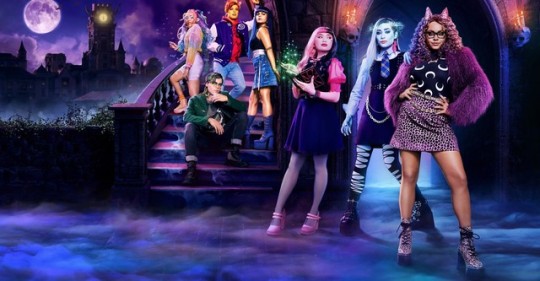
🌹🦇Things I Liked About The Movie🦇🌹
Frankie…thats it thats the post - Ceci played the HELL out of them I loved the casual representation like the thing I hate about most shows that add representation is thats all there is to the character and here it isn’t the case Frankie is my favorite character of the movie not just because of them being nonbinary. between the Info-dumping and how relatable their struggle with socializing was and how consistent they were with their movement and the first day they were 15 days old and the next they were 16 days old I really enjoyed that. They in my opinion had the best outfits in the movie like I did not hate them as someone where my clothing and makeup expression is very important to my gender presentation. Overall they held up the movie definitely.
The music was fucking great there was not a bad song all of them bops going onto my musical playlist hell my main playlist even cuz the hyperfixation is real
The visuals and like background music was so on brand in my opinion like I don’t know how they could have been done better with the budget they had I really did feel immersed in the universe
The humor was also so on brand the football scene and the main 3 disturbing ghoulias rest in the graveyard were some highlights for me
Eventhough I am Jacksons biggest simp the teacher I did like I know alot of people were saying it was predictable but their motives and everything and how they didn’t want Clawdeen to get involved and thought their way was the best way for her I enjoyed. and hell from what i recall they never said his first name that could be Jackson.
I enjoyed headmistress and Dracula’s characters they are just as I would have imagined them and how Draculaura has conflict with her dad due to their family’s legacy I related to alot as a kid who feels like they haven’t done enough as an 18 year old because my siblings already had cars and high gpas and stable jobs by then
🌹🦇Things I Disliked About The Movie🦇🌹
Cleo - fucking white woman jumpscare everytime she came on screen I omfg
The casting in general when it came to the poc in the movie yall know damn well Cleo and Clawdeen could and should have been casted by darker actresses and the argument of talent can not be made because there are plenty of darker skinned poc actresses who can act and sing yall could have found
i wish they kepted ghoulia nonverbal/speaks zombie i made a post touching on this lightly ill link it here
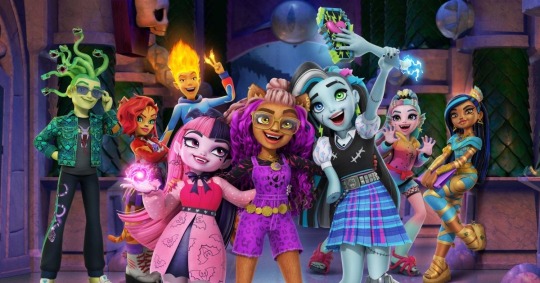
🍒🧟Things I Liked About The Cartoon🧟🍒
Draculaura, Cleo, and Lagoonas cartoon characters looked very cute
Im trying to be positive here okay
🍒🧟Things I Didn’t Like About The Cartoon🧟🍒
TORALEI!! im not even not even upset about the fact that she’s fucking british okay its the fact they scrapped her origin of being an orphan that had a rough upbringing and how they brought nuance to her character instead to make her some bigoted chav she was one of my favorite characters and yall shat on her
youtube
i didnt like the story felt rushed and cheap but that was only one episode I watched so
felt like a baby show and not a good one like miraculous ladybug or sophia the first like just bright colors make them shut up for 10 minutes baby show i was hoping for something fun to watch at any age like the og Bratz show
the styles of the character are hard to look the only ones that I like are draculaura and cleo and maybe lagoona really the rest of them I don’t see myself getting dolls of which makes me upset cuz as someone who really liked live action Frankie if their doll looked like that I would have bought it
why did they make clawdeen biracial? i dont know if this is for the show and the movie im assuming both because of how the character looks. like did the idea of having a fully black main character not vibe with y’all what is the reason if yall wanted to have a biracial character then create a new character making a character who was fully black now biracial is crumby as hell making it seem as if having a dark skinned femme lead isn’t appealing
this can apply to both the movie and the show really where are clawdeens siblings??? howleen my girl where are you!! clawd my himbo!? i loved how the wolf siblings showed the variety of shades black teens came in and their characters in general and thats just gone now
ill add more as i go!!🖤
5 notes
·
View notes
Text
Japanese vs. English Dabi A 293 Comparison
Chapter 293 gave us another great speech by Dabi, filled with all kinds of information. Similar to my post for the previous chapter, the official translation for chapter 293 has, unfortunately, once again made some changes in regards to Dabi’s speech due to its bias that I would like to share and explain here to give a better understanding of Dabi’s actual character rather than just leaving it at his American version.
Because Dabi said so much in this chapter and we will be comparing the panels from the Japanese version and the official English translation and taking apart the Japanese phrases, the rest of the post is under the cut (this post may or may not be just below 6k words)
The interaction begins with a short exchange between Dabi and Shouto as the former is hugging his younger brother mid-air while the others are still on the ground trying to take down Machia. In the official translation, Dabi begins by pointing this situation out to Shouto.
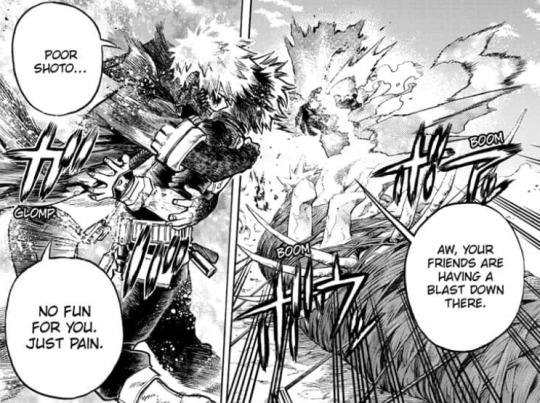
The two panels aren’t too different from the Japanese version, but this is another case of lost nuance. So here’s the original for comparison:
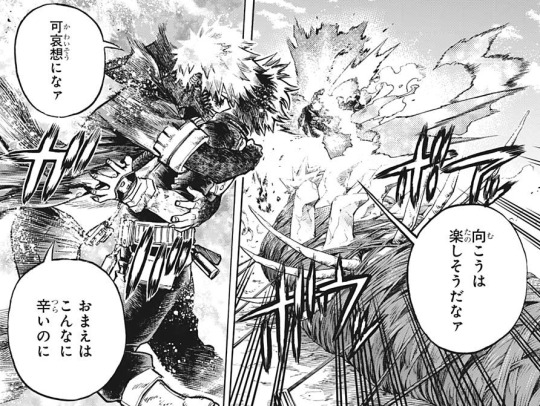
The speech bubbles read:
「向こうは楽しそうだなァ」
「可哀想になァ」
「おまえはこんなに辛いのに」
Breaking down the first line we get
「向こう ; mukou」-> other side; other party
「は ; wa 」-> topic marker particle
「楽しそう ; tanoshisou 」-> looks fun
「だ ; da 」-> casual form of です (desu); be; is
「なァ ; naa 」-> sentence ending particle; expresses emotion/sentiment
= “The others seem to have fun, huh?”
Then we have the second line:
「可哀想に ; kawaisou ni 」-> pitiable; poor (interjection)
「なァ ; naa 」-> sentence ending particle; expresses emotion/sentiment
= “Poor thing, huh?”
And the third line:
「おまえ ; omae 」-> you
「は ; wa」-> topic marker particle
「こんなに ; konnani 」-> so; like this
「辛い ; tsurai 」-> bitter; painful; heart-breaking
「のに ; noni」-> even though
= “Even though it’s so painful for you.”
Someone made a post a few days ago where they made an interesting note about this part, specifically that last line, that I think is worth mentioning here: this situation is Dabi comparing his own past to Shouto’s present. Touya was in pain for so long until he burned to death because no one helped him (and by that I mean an adult that could’ve actually helped him and not his younger siblings). Similarly, Shouto has been in pain for so long and now that it’s especially obvious to those around him as he is in the process of being burned, no one is helping him and instead, they continue fighting each other. And while Dabi doesn’t know the extent of this, it’s true that Shouto has been vocal about his family’s circumstances and yet no one’s ever done anything about it. So while Dabi at this moment is primarily referring to the fact that in this very instant no one is immediately by Shouto’s side to save him, it’s also unintentionally pointing out how no one in charge ever looked at the teenager with a huge scar on his face who openly hates his father so much and thought to maybe at least ask him about it.
You can argue that that is interpreting too much because “Dabi doesn’t care about him” - but I think that Dabi not knowing enough about Shouto and seeing him as nothing but “Endeavor’s doll” and Dabi recognizing that Shouto is in a similarly bad situation as Dabi are two statements that can coexist, especially since he is right in saying that right there no one is helping Shouto. And, again, based on his broadcast and how much his speech has changed to be more polite and humble in contrast to his usual direct, rough ways, it’s important to recognize that Dabi has an understanding of people (and how to get to them).
So while his mind might be too focused on his hatred for Endeavor, there might also still be that ability to acknowledge that those around him are hurting, too. This is an important problem within the fandom (and outside of it) as far as vocabulary goes - a lot of people throw around the word empathy and how awful it is when someone lacks it. But empathy is the ability to feel someone else’s emotions. And you don’t need to actually feel what they are feeling in order to recognize their emotions, which is far more important. This understanding of someone else’s emotions is sympathy. Compassion, on the other hand, is not just understanding someone’s emotions, but also trying to alleviate someone’s negative emotions. So even if Dabi doesn’t care about people, he can still recognize when someone is in pain.
After this, we get Shouto’s only line of that chapter, and as much as I wished he was given more lines, this one’s so good, it’s okay there isn’t more:
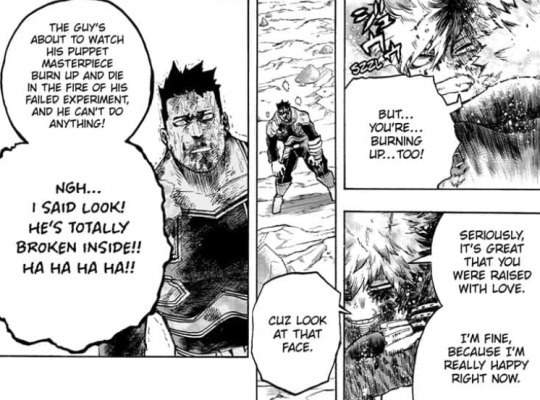
Above you can see the English translation having Shouto say “But... you’re... burning up... too!”
For comparison, here is this same part in Japanese:
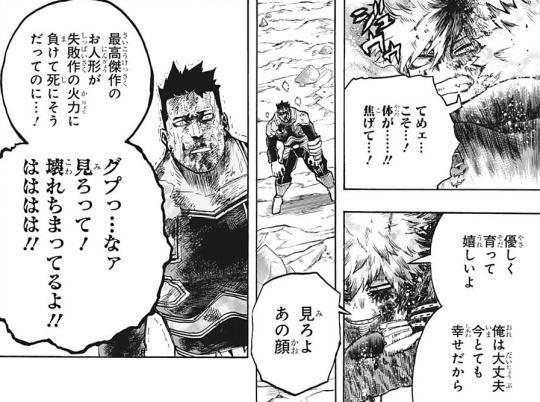
Starting with Shouto’s line, we got「てめェ。。。こそ。。。体が。。。焦げて。。。!」
This line already broke itself apart! How nice.
「てめェ ; temee 」-> you
「こそ ; koso 」-> for sure; emphasizes preceding word
「体 ; karada 」-> body
「が ; ga 」-> subject marker particle
「焦げて ; kogete 」-> to burn; to get burned (the dictionary form of this is 「焦げる」(kongeru), the te-form is used here to leave the sentence trailing)
= “YOUR body... for sure… will… get burned…!”
The reason I’m saying this line is so important is the emphasis on the “you” part through the usage of koso. The general content of the sentence already tells us this, but that emphasizing nuance doesn’t exist in English (unless you bold, italicize, and underline it). The line is important because we’re shown someone who is in the process of being burned alive, and yet his worry is on the person trying to kill him rather than anything else. He isn’t trying to argue with him, isn’t trying to protect himself - he’s simply saying: this is hurting you. It’s interesting because in the eyes of those around him, Shouto is the one hurting the most. But to him, it’s Touya who is hurting the most. To him, this isn’t the hero-to-be Shouto being fought by the villain Dabi. This is big bro Touya hurting himself for the sake of getting at their awful dad. And little bro Shouto is only thinking about his big bro.
Now for Dabi’s response, we get the line that particularly stuck out to me as far as the English translation goes: “Seriously, it’s great that you were raised with love.” What? If you read the fan translation, you might remember this line as “You’ve grown up to be so considerate - I’m happy for you little bro” - so which one is more correct? If you guessed the fan translation then, unfortunately, you are correct!��
The Japanese line reads 「優しく育って嬉しいよ」
「優しく ; yasashiku 」-> ; tender; gentle; kind (adverbial form of「優しい」(yasashii))
「育って ; sodatte 」-> to be raised; to grow up; (te-form of「育つ」to indicate reason & means (this part results in the second part of the sentence))
「嬉しい ; ureshii 」-> happy; glad
「よ ; yo 」-> sentence ending particle; shows emphasis
= “I am glad because you grew up kindly”
First of all, an adverb is nothing other than an adjective that is directly affecting/describing the verb it precedes. So to understand that in reference to this sentence, you can ask the question “how was he raised?” - with the response being “kindly.” If you wanted to say “raised with kindness” on the other hand, you would have to turn the adjective into a noun. That part of the phrase would then be 「優しさで育って」As you can see, that’s not what it says in the original version.
More importantly, the word “love” is not part of this, so I don’t know why that word is used here. It really gives off a wrong understanding of what is actually being said here. The official translation makes it sound like Dabi is saying “I’m glad you were raised with love, while I wasn’t” sort of like a complaint?
We still don’t know exactly what Touya’s upbringing was like, but we do know that things gradually got worse over time, so with the assumption that he was raised in a more positive (not good, just better in comparison) environment than Shouto, the English statement then doesn’t make sense since he was “loved” too for a long time.
Besides, he is saying that in direct response to Shouto displaying his worry for Dabi, which says nothing about how he was raised but everything about what kind of person he is (a kind one).
Furthermore, it leaves out the part where Dabi says he’s happy about this. Instead, he just says “it’s great” - which is more something used when you can acknowledge a situation being good for someone else, even though you don’t have any particular feeling about it. It’s very objective, yet in the original, he is stating his emotions with this.
The official translation, in my opinion, just ends up turning the two against each other (more specifically turning Dabi against Shouto), when in reality, Dabi is happy that Shouto shows compassion for him here, despite Dabi currently trying to kill him. In other words, he is surprised by Shouto’s concern for him and happy to be proven wrong about him.
Next, we got「俺は大丈夫今とても幸せだから。」
「俺 ; ore 」-> I
「は ; wa 」-> topic marker particle
「大丈夫 ; daijoubu 」-> alright
「今 ; ima 」-> now
「とても ; totemo 」-> very
「幸せ ; shiawase 」-> happy
「だから ; dakara 」-> because (indicates a reason for something)
= “I’m alright, I’m really happy now, so...”
There are two things to note here in relation to the previous phrase. First of all, notice how both phrases include the word happy. In the first phrase, the Japanese word is ureshii, whereas in this phrase it’s shiawase. Once again, this is a question of nuance.
Ureshii is more of an immediate feeling that you feel in that exact moment. It’s a feeling that isn’t going to last forever (for example the joy you feel when you receive a gift).
Shiawase, on the other hand, is a long-term happiness.
The way to interpret why he is using both these terms is that he uses ureshii as his reaction to Shouto showing that he cares. He most likely didn’t anticipate for Shouto to say something like that, so signaling his concern for Dabi made the latter feel joy in that very moment.
So what about the happiness he talks about in the second phrase, how is it different from the first one? Clearly, Dabi is not exactly someone you would describe as happy when looking at the overall picture. I think one possible explanation as to what the shiawase here refers to is that Dabi has accepted his situation. While it wouldn’t be accurate to describe his state as one of having moved on from the past - clearly - at the very least, through admitting to his past and having distanced himself from that dark place, he has been able to now be in a better situation, where he is allowed to just live rather than trying to prove himself to someone day after day.
The second thing to note is that you might be wondering why I ended the sentence with “...” when the official translation is “I’m fine, because I’m really happy right now.”
Well, it’s kind of an odd sentence, isn’t it? The sentence as it is right there is just giving us a reason. But a reason for what? In Japanese, it’s okay to omit the main clause (the phrase that would follow after this to explain what you just gave a reason for) when it’s obvious what you’re talking about.
This confused me for a little bit until I thought about what sentence came before this one. Right before this Dabi says “I’m glad you were raised kindly.” The sentence we’re looking at right now is an extension of that. And what came before that sentence?
Shouto saying: “Your body will burn too.”
See what I’m getting at?
As explained before, Shouto is essentially telling Dabi “I know you want to kill me, but this is going to kill you.” Now if you add Dabi’s two phrases to that, you get his response as “I’m glad that you’re so considerate. That makes me really happy, so it’s alright if I die.”
Many people have pointed out before that Dabi doesn’t care about whether or not he will make it out alive and this is essentially him confirming just that. His only goal is to ruin Endeavor and knowing he is doing that is enough for him to accept death.
He then continues to explain that joy of his with the next sentence:「見ろよあの顔」
「見ろ」-> look (volitional form)
「よ」-> adds extra emphasis after volitional form
「あの」-> that
「顔」-> face
= “LOOK at that face!”
With his goal being all about destroying Endeavor, seeing this man look so defeated right there is the first proof for Dabi that his plan has worked out. While he doesn’t know yet what the actual consequences for Endeavor are going to be after this, he certainly has damaged him.
The next line reads:「最高傑作のお人形が失敗作の火力に負けて死にそうだってのに。。。!」
「最高傑作 ; saikoukessaku 」-> masterpiece
「の ; no 」-> hierarchy particle (the word before is the general noun, the word after the specific noun)
「お人形 ; oningyou 」-> doll
「が ; ga 」-> subject marker particle
「失敗作 ; shippaisaku 」-> failed creative work
「の ; no 」-> particle to indicate possession, works like an apostrophe
「火力 ; karyoku 」-> firepower
「に ; ni 」-> indirect object marker
「負けて ; makete 」-> being defeated (te-form because another verb follows)
「死に ; shini 」-> going to die
「そうだって ; soudatte 」-> I’m saying it’s so
「のに ; noni 」-> shows disappointment (“If only that weren’t the case”)
= “I say it’s a shame that the masterpiece doll is about to be defeated and die by the firepower of the failed creative work.”
A lot of people take issue with Dabi yet again referring to Shouto as a “doll” here. Obviously, that isn’t a nice thing to say, but please keep in mind that Dabi doesn’t really know Shouto and with that also doesn’t know how Shouto feels about Endeavor. All Dabi sees is Shouto being a hero-to-be, just like Endeavor has planned. Keep in mind that Dabi used to be in Shouto’s shoes, which makes looking at Shouto be like looking in a mirror and seeing young Touya trying so hard to be what his father expects of him, yet failing over and over again. They were both born for that selfish purpose. They were never born to be people, but only born to be what their father needs them to be. And now that Dabi has broken free from that role, it’s natural for him to describe Shouto’s position as such to emphasize it in case the others haven’t understood that this is the reason for their existence and them being right there in that exact moment.
The final part says「グプっ。。。なァ見ろって!壊れちまってるよ!!ははは!!」
「グプっ ; gupuu 」-> special effects sound (I will explain this one in a second)
「なァ ; naa 」-> when placed at the start of a sentence it’s an attention seeker, kind of like a “hey!”
「見ろ ; miro」-> look (volitional)
「って ; tte 」-> to say (in casual conversation this can be used to repeat what one has just said to stress one’s own quote; can show frustration)
「壊れちまってる ; kowarechimatteru」-> be broken (unintentionally; regretfully)
「よ ; yo 」-> sentence ending particle to show emphasis
「ははは ; hahaha 」-> laughing sound
= “Hey, I said LOOK! He is completely broken, hahaha!”
As mentioned in the translation comparison for the last chapter, the chimatteru indicates that the verb it attaches to has happened unintentionally or has yielded regrettable results. We know that it is Dabi’s intention to hurt Endeavor - so him being broken is neither unintentional nor is it regrettable to Dabi.
So in this case it’s not so much about how Dabi feels. Instead, it’s probably more fitting to say that it’s about Endeavor. This situation has broken Endeavor (which is regretful), even though it had never occurred to him that the past could come back to haunt him (he has not intended for this to happen).
[edit because someone pointed out that (as mentioned for the 292 comparison) chimatteru can also be used to indicate something has been done completely, so in this case he is saying Endeavor is completely broken]
Now for the part that I neglected before: the special effects sound gupuu. The reason I have been holding off an explanation is simply that it’s not necessarily that important for the sentence, however, when I looked this up this was the result:

Yes, you’re reading that correctly: *slurp*
I had a good laugh about that. The holy trinity of the slurping brothers is complete (albeit Dabi doesn’t have the noodles to go with it)
Anyway, back to the serious stuff!
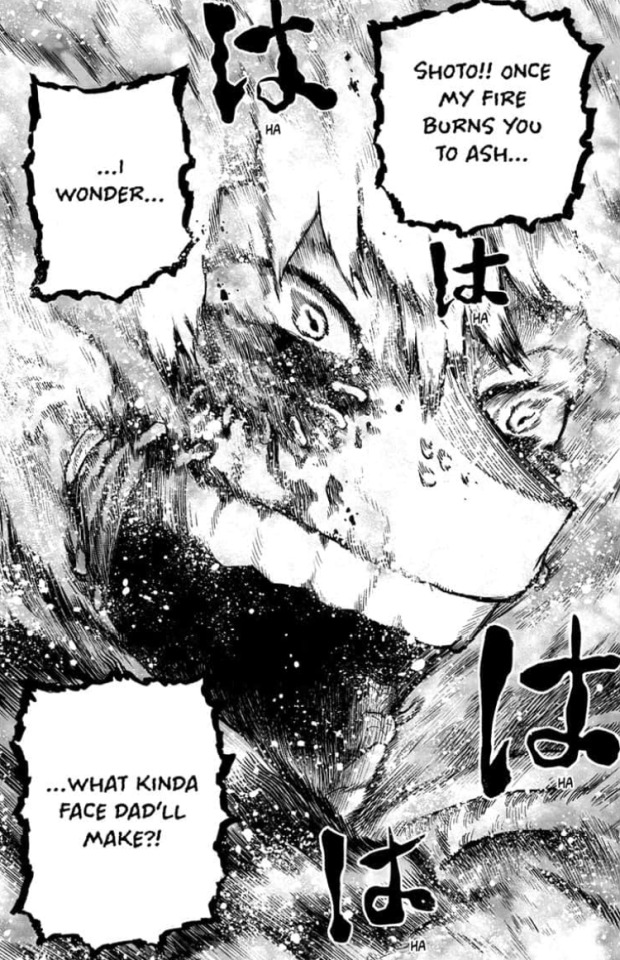
Next, we get this big panel of Dabi with the three speech bubbles. Notice that there are several ha to indicate that he is laughing.
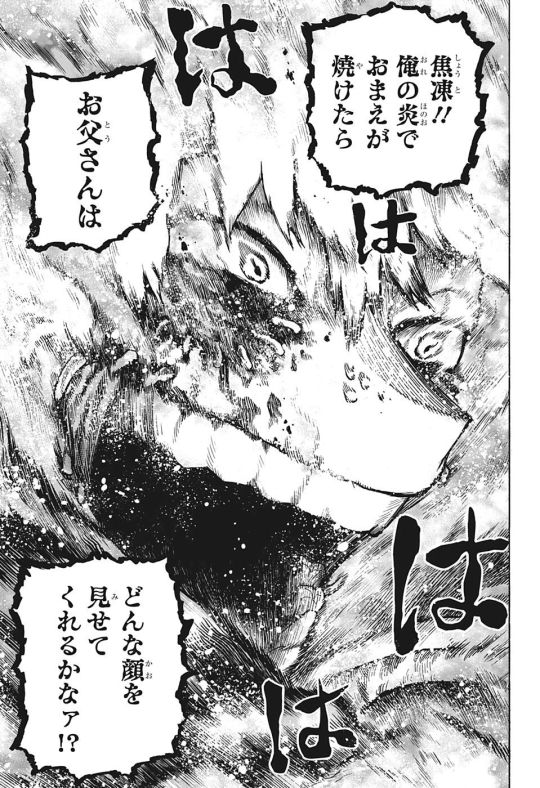
The speech bubbles all put together read:「焦凍!!俺の炎でおまえが焼けたらお父さんはどんな顔を見せてくれるかなァ!?」
「焦凍 ; shouto 」-> Shouto
「俺 ; ore 」-> I
「の ; no 」-> particle to indicate possession, works like an apostrophe
「炎 ; honoo 」-> flames
「で ; de 」-> by
「おまえ ; omae 」-> you
「が ; ga 」-> subject marker particle
「焼け ; yake 」-> to burn
「たら ; tara 」-> when (focuses on the results that can come from this first part)
「お父さん ; otousan 」-> dad
「は ; wa 」-> object marker particle
「どんな ; donna 」-> what kind of
「顔 ; kao 」-> face
「を ; wo 」-> direct object marker particle
「見せて ; misete」-> to show (te-form to connect to the next part)
「くれる ; kureru」-> something was done for the speaker (being shown)
「かなァ ; kanaa 」-> I wonder
= “I wonder what kind of face dad will show me, when you get burned by my flames, Shouto!?”
The official translation added the “burn you to ash” part, which just adds more harshness to this than there already is. I’m not exactly opposed to that as I do recognize that he is being harsh here, however, this overall theme of adding words to make the villains sound harsher is just not what a translator is supposed to do so it is important to point it out.
Also notice the kureru, which is used when something was given to or done for the listener (i.e. a favor). Previously, Shouto has pointed out that Dabi would not survive his attempt at burning Shouto, either, and yet here he is wondering specifically what face Endeavor will show him. He isn’t just wondering what face this man will make, but what his reaction would be that his own failure has killed his masterpiece.
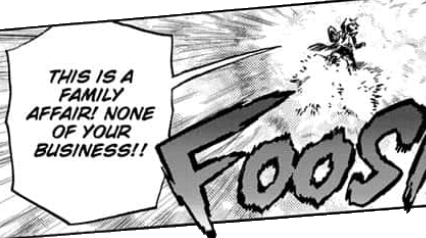
After Deku interferes we get this panel of Dabi and this is where the conversation between him and Shouto ends and his speech to Deku starts.
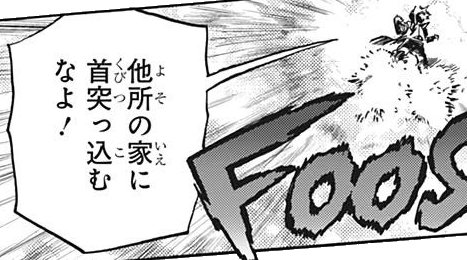
The Japanese version essentially says the same as the translation:「他所の家に首突っ込むなよ!」
「他所」-> another place; outside (one’s family or group)
「の」-> particle to indicate possession, works like an apostrophe
「家」-> family
「に」-> in
「首突っ込む」-> expression to poke one’s nose into another’s affair; lit.: “to thrust one’s neck into something”
「な」-> sentence ending particle; expresses emotion/sentiment
「よ」-> sentence ending particle; shows emphasis
= “Don’t stick your neck (nose) into other people’s family!”
After this, we get the part where Deku gives his speech with the “And guess what?! You’re not Endeavor!” part that was supposed to… reach what exactly?

Someone pointed out that this wasn’t supposed to be an “It’s your power!” 2.0 speech, because with Shouto, Deku wanted to get to him and help him. With Dabi, on the other hand, he is saying (and he literally is saying this) that Endeavor is trying to be better. And Dabi not being Endeavor means that Dabi is not trying to be better. That, in turn, means that Deku is watching this Endeavor, the one that is trying to be better, but someone like Dabi who isn’t trying isn’t something worth watching.
Anyway, regardless of what the point of that phrase was, Dabi’s reaction is mocking this obvious statement
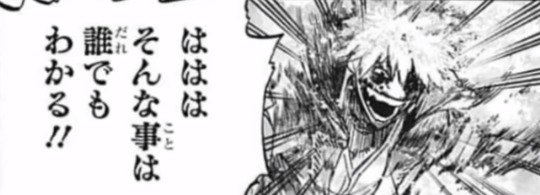
The Japanese line says「はははそんな事が誰でもわかる!!」
「ははは ; hahaha 」-> laughing
「そんな ; sonna 」-> such
「事 ; koto 」-> thing
「が ; ga 」-> subject marker particle
「誰でも ; daredemo 」-> anyone
「わかる ; wakaru」-> to understand
= “Hahaha, anyone understands such a thing!”
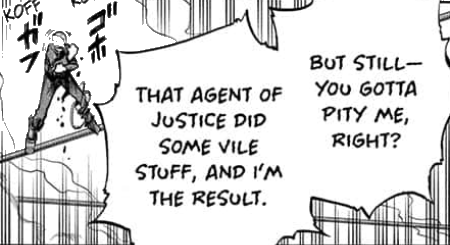
Continued by this part.

The first line here says「でも俺はかわいそうな人間だろ!?」
「でも ; demo 」-> but
「俺 ; ore 」-> I
「は ; wa 」-> topic marker particle
「かわいそうな ; kawaisou na 」-> pitiable; poor
「人間 ; ningen 」-> human
「だろ ; daro 」-> don’t you think?
= “But I am a pitiable human, don’t you think!?”
What’s interesting to note about this line is the use of ningen. Normally, you would more likely use the word「人」(hito), meaning person, when you put another word in front of it. After all, when you talk about another person (much like I am using the word right now) it’s obvious they are human, so you wouldn’t need to use the word human.
With that, Dabi specifically using the word human here is done in order to humanize himself to Deku. Not only is he asking “hey, don’t you pity me at least a little?” but rather he is saying: “I get that you think I’m just some low-life villain, but I am a human being with valid feelings, so don’t just ignore them because you don’t see me trying.”
Again - Dabi chooses his words carefully and this is no exception.
If you paid extra close attention, you might have noticed that the word kawaisou gets used again. But did you spot the difference? While in the first example the word is written in kanji as 「可哀想」now it’s completely written in hiragana. Why is that? You might wonder, and I did too. Keep in mind that the first time the word gets used here (written in kanji), Dabi is referring to Shouto. This time (written in hiragana) he is referring to himself. Kanji are generally used because it makes texts easier to read since there are no spaces in Japanese. Much like the rest of us, Japanese people are also born with zero kanji knowledge and learn about them as they grow up. Because of this, books for children tend to just be in hiragana (the letter Kota writes to Deku thanking him for having saved him is also written in just hiragana) so they can easily read them. With that, a text in all hiragana gives off a more childish, cute, innocent kinda feel.
Obviously, in spoken Japanese, you can’t hear that he is saying this word in hiragana. But we know that he is. So aside from him using the word human to make him more, well, human, he is also saying the word pitiable in an innocent way, which furthers the image he is trying to create of himself; that of an innocent human being that has been wronged. Because clearly, someone has to help the heroes see that villains are also people. As mentioned before, this is a common theme of the League of Villains and has most recently been brought up by Toga’s question to Uraraka of whether or not the heroes saw Twice as a person. Dabi is, in a way, asking that same question, just with several exclamation marks.
The second line says「正義の味方が犯した罪それが俺だ!」
「正義 ; seigi」-> justice
「の ; no 」-> particle to indicate possession, works like an apostrophe
「味方 ; mikata 」-> supporter
「が ; ga 」-> subject marker particle
「犯した ; okashita 」-> committed
「罪 ; tsumi 」-> crime
「それ ; sore 」-> that
「が ; ga 」-> subject marker particle
「俺 ; ore 」-> I
「だ ; da 」-> casual form of です (desu); be; is
= “The crimes committed by the champion of justice: that’s me.”
That first part seigi no mikata is sort of a set expression, but I wanted to break it down so you can see what the actual words are. It’s generally translated as champion of justice, knight in shining armor, crime avenger, or hero. Hero is obviously not the right translation here, since they just use the word hero for the profession. Champion of justice is just the closest to the actual words, hence I chose that translation.
The official translation is once again being biased with this sentence, this time though not so much to make the villains look worse, but to make a hero look less bad. While the Japanese version says that this “champion of justice” aka Endeavor has committed crimes that resulted in Dabi’s existence, the translation changed it to “did some vile stuff” which is seriously downplaying the fact that a Pro Hero, whose job it is to fight criminals, is actually a criminal himself! It’s just yet again a very odd change to make, especially given the fact that we know that Endeavor has committed crimes. So why make it sound like less here?
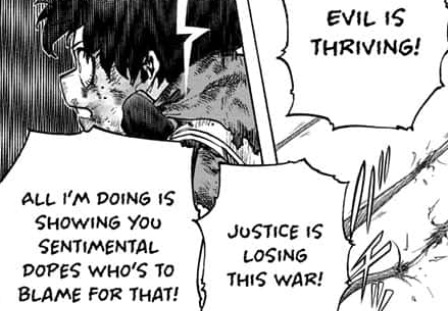
Okay, so you might be confused about this line if you read both the fan translation, as well as the official translation.
Again, the official translation says “evil is thriving” - the fan translation, on the other hand, says “evil will no longer prosper.”
To opposite meanings for the same short phrase. Why is that?
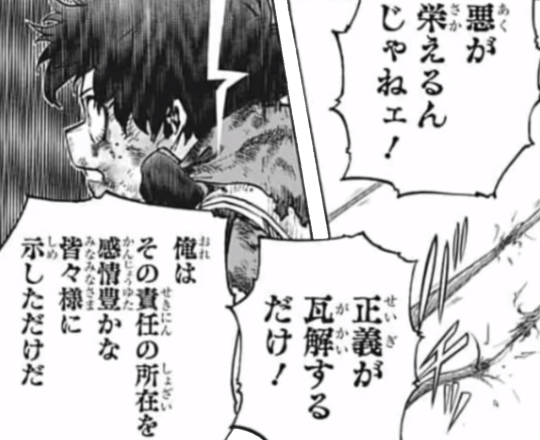
You see, the first line says「悪が栄えるんじゃねェ!」
「悪 ; aku 」-> evil
「が ; ga 」-> subject marker particle
「栄える ; sakaeru 」-> to prosper
「んじゃねェ ; n janee 」-> “isn’t it” (see explanation below)
= “Evil will prosper, won’t it?”
The reason for that confusion is that last part, n janee, because its meaning depends on the context, and with that, in cases like this, it’s less obvious which it is.
This is a rougher way of the casual n janai, which is a more casual way of no janai, which is a more casual form of no de wa arimasen. Or in simple terms: it’s very casual.
So what does it mean? Like I said, the meaning depends on the context.
The no is an explanatory particle and when paired with janai can be used for when you express an opinion, whilst seeking the listener’s opinion.
So you can treat it as a “isn’t it” in an affirmative sentence (when you express your opinion or talking about probability), but you can also use it to negate a sentence (hence the two opposite translations). The former can also be used when you’re making a point.
Knowing that it’s pretty much down to context, we have to ask what makes more sense. Is Dabi saying that evil will prosper, or is he saying evil doesn’t prosper?
To put this into context, you have to look at the surrounding sentences. Prior to this one, Dabi mentioned that he is the crimes of the hero system. In the next phrase, he talks about justice collapsing. Because of that, I think “evil will prosper” is a more accurate translation as justice collapses as a result of evil - unless you interpret evil as being about the heroes.
Anyway, the second line says「正義が側板するだけ!」
「正義 ; seigi 」-> justice
「が ; ga 」-> subject marker particle
「側板 ; gakai 」-> collapse; downfall
「する ; suru 」-> to do (turns the noun it attaches to into a verb)
「だけ ; dake 」-> only
= “Justice will only collapse!”
If you look back at the official translation, it says “Justice is losing this war!” Meanwhile, the Japanese version doesn’t mention the words losing or war. While they still somewhat say the same thing, losing a war doesn’t inherently lead to irreversible, long-term effects. Instead, this situation is about more than just losing this war. The entire system is taking a fatal blow from this. Not even so much from this war, though. The reason Dabi is so certain that this will be the downfall for justice is that how are people supposed to still trust in this justice system when those that are supposed to defend it are criminals themselves? It’s more of a natural consequence resulting from a system that has been corrupt for far too long - the exposure is simply what will put an end to it.
The third line in that part is「俺はその責任を感情豊かな皆々様に示しただけだ」
「俺 ; ore 」-> I
「は ; wa 」-> topic marker particle
「その ; sono 」-> that
「責任 ; sekinin」-> duty; responsibility
「を ; wo 」-> direct object marker
「感情 ; kanjou」-> emotion
「豊かな ; yutaka na」-> extremely; very
「皆々様 ; minaminasama」-> everyone
「に ; ni 」-> to
「示した ; shimeshita」-> pointed out; showed
「だけだ ; dake」-> only
「だ; da 」-> casual form of です (desu); be; is
= “I only pointed this responsibility out to all you very emotional people.”
What irked me about this phrase in particular in the official translation was yet again the choice of words. I get that Dabi has a rough way of speaking. But sometimes, he chooses to use polite words and that shouldn’t be erased.
So when the official translation makes him say “All I’m doing is showing you sentimental dopes who’s to blame for that!” It’s just a rude phrase. But in Japanese he says minaminasama. You might be familiar with the word minna or minna-san, with the san in the latter example being a polite suffix (kind of like Mr./Mrs.,...). Sama is similar to that but even more polite. So minaminasama is about as polite as you can go. There might not be a direct English equivalent to that level of politeness, but I think we can all understand that “dopes” is not a correct translation here.
The responsibility/blame part goes back to what Deku said to him. “You aren’t Endeavor” - no, he isn't. And no, he isn’t exactly trying to be better. But that kind of mentality only ignores the obvious fact that this all could’ve been prevented, had it not been for Endeavor and his own selfish goals. It was a hero - the “champion of justice” - that committed crimes just like a villain. But it’s unheard of for a hero to do such a thing. Society doesn’t get shaken at its core when it hears about a villain committing a crime. A hero, on the other hand, being found guilty of a criminal record, will lead to people doubting the integrity of heroes altogether and that is not Dabi’s doing. All he does is share the truth.
To round this speech off, we get one last phrase:
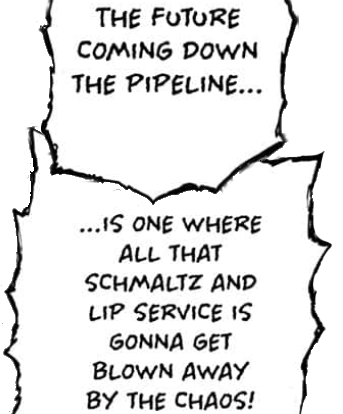
“The future coming down the pipeline… is one where all that schmaltz and lip service is gonna get blown away by the chaos!”
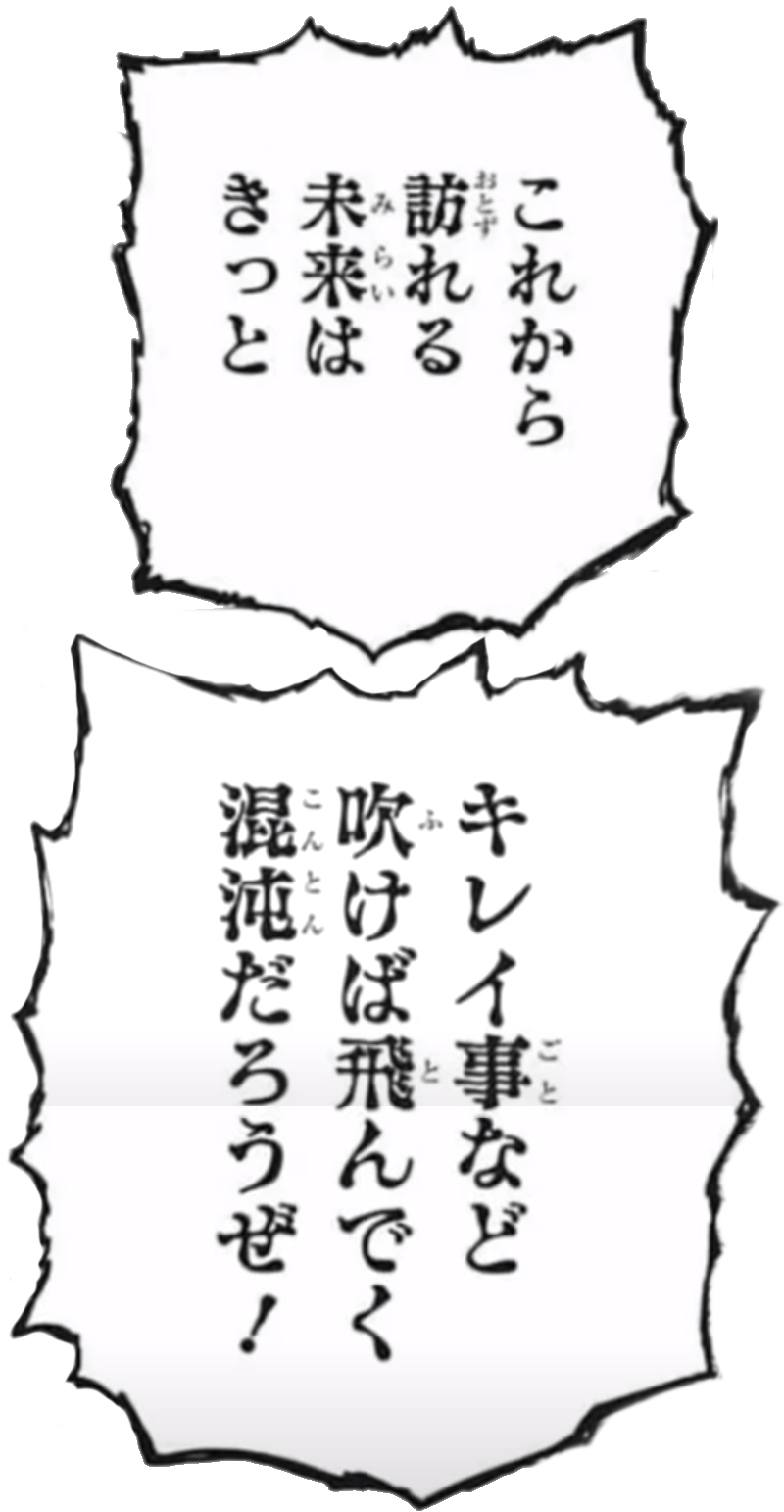
The Japanese line says「これから訪れる未来はきってキレイ事など吹けば飛んでく混沌だろうぜ!」
「これから ; korekara 」-> from now on; after this
「訪れる ; otozureru 」-> to arrive
「未来 ; mirai 」-> future
「は ; wa 」-> topic marker particle
「きっと ; kitto 」-> surely; without a doubt
「キレイ 事; kireigoto」-> glossing over; lip service
「など ; nado 」-> such as
「吹けば ; fukeba 」-> to blow (conditional form of fuku)
「飛んでく ; tondeku」-> to go flying (short for tonde iku)
「混沌 ; konton」-> chaos
「だろう ; darou」-> it seems; don’t you think?
「ぜ ; ze 」-> ending particle for emphasis (more casual/ruder version of yo)
= “Surely, if things like this lip service get blown over, the future coming after this will be chaos flying around.”
In Japanese, there are several conditional forms. The ba form, as used here in fukeba, is used when the preceding clause expresses a condition, which results in natural consequences. In this case, something happens in case pretty things get blown over.
Mirai is one of the words you can use to talk about the future in Japanese. This word is more intangible and more general rather than being about one specific event or person, so everyone will be affected by this.
And with that, we have made it through all of his speech from this chapter, congrats!
Something you may have noticed is that there are plenty of particles you can use at the end of a sentence, usually for emphasis. One of the most common ones you find throughout the chapter are yo and ze. Yo is a pretty standard one to show emphasis, whereas ze is more of a colloquial version of yo that has an assertive feel and is therefore usually only used when speaking in very casual conversations or to someone of lower social status than you. Dabi has used this on Endeavor before and is now also using it on Deku - aka his opponents.
Going back to the start of the chapter when Dabi is mainly focused on Shouto, though, he ends most of his sentences with naa. As mentioned before, this particle is used to express emotions/sentiment.
He also uses that during their first on-screen interaction during the summer camp. While I do think that Dabi is mainly still only seeing Shouto as an extension of Endeavor, I do think that there is also a part of him that does see himself in him and that can somewhat sympathize with him. He isn’t being as rough on him overall (verbally that is), and instead is trying to come off as more emotional, possibly just to appeal more to him.
To sum it up, there are a lot of things that just get lost in translation due to nuances that don’t exist in English. More often than not, though, the villains are being given harsher words, whereas anything related to heroes is softened. Dabi is constantly shown to be someone who puts great care and thought into the words he uses, so there is a lot of that emotional intelligence that gets neglected in the translation and then makes him seem more like someone on a random mission rather than someone who has put genuine thought into this.
There are still so many people in the fandom who, for some reason, think Dabi is in the wrong and irredeemable for having killed thirty people, whilst having the same stance as Deku in thinking that Endeavor is much better because at least he is trying.
While they should both be held accountable for their actions, Dabi has a good point when he said that heroes are to blame for his existence and that their crimes are what will ruin the justice system and not him.
Best Jeanist’s reaction to this whole situation was complaining that Dabi uses his personal past to shed a bad light on the heroes, which summarizes that exact problem of the hero society: That heroes are more concerned with their own image than actually being heroes who go above and beyond to bring about peace and safety.
Seeing Shouto’s reaction, being concerned about his big brother rather than himself, is at the very least giving some hope that at least one person on the hero side is able to see beyond the villain exterior and see them as a human-being - without needing a long speech for it.
We’ll have to wait and see how this is going to continue, but in more likeliness, the official English translation will continue to include its bias.
If you’ve made it this far - thank you so much for reading! This post was filled with a lot of information and trust me when I say some of these lines almost broke me as I tried to understand them. I hope I could clarify some parts of the chapter, though, specifically Dabi’s character, since the official translation loves to change his character.
#bnha#dabi#293#translation#meta#boku no hero academia#bnha 293#todoroki#shouto#touya#mha#my hero academia#mine#japanese
679 notes
·
View notes